Magdalena Klimek PhD
Research interests
Human evolutionary biology, fetal programming, developmental origins of health and disease (DOHaD), epigenetics
Research projects
2018-2021 Developmental programming and physical activity at adulthood in relation to levels of sex steroid hormones in women: implications for breast cancer prevention. Grant from National Science Centre, P.I.: Grazyna Jasienska, Executor
2015-2017 Afast! Say it. Grant from National Centre for Research and Development, P.I.
2014-2016 Biomarkers of fetal programming and female health and fertility, Grant from National Science Centre, P.I.
2015 Hormonal levels and sexual selection; an innovative approach towards human sexual preferences, Grant from National Science Centre, P.I.: Urszula M. Marcinkowska, Research Team Member
2011-2015 Fertility and aging and lifespan of women, Grant Ideas Plus from The Ministry of Science and Higher Education, P.I.: Grazyna Jasienska, Junior Researcher
2011-2015 Parameters of reproductive history and aging and lifespan of women, Grant from National Science Centre, P.I.: Grazyna Jasienska, Junior Researcher
2012 Impacts of Maternal Environment on Breast Milk composition, P.I.: Katie Hinde, Harvard University, assistant
2010-2011 Life style, work and hormones, P.I.: Louis Calistro Alvarado, University of New Mexico, assistant
2011 Lifestyle and hormone levels in menstrual cycle, P.I.: Anna Ziomkiewicz-Wichary, asystent
2010 Food Allergies among citizens of Beskid Wyspowy Mountain Range, P.I.: Kathryn Clancy, University of Illinois at Urbana-Champaign, assistant
2008-2010 HAPPIE – Health, Alcohol and Psychosocial Factors in Eastern Europe, P.I.: Andrzej Pajak, Jagiellonian University Medical College, assistant
2010 Men’s life history, hormones, and health project, University of New Mexico, P.I.: Louis Calistro Alvarado
Publications
Galbarczyk A, Klimek M, Nenko I, Jasienska G. 2018. Sons may be bad for maternal health at older age. New evidence for costs of reproduction in humans. The Journals of Gerontology Series A Biological Sciences and Medical Sciences 74 (5), 648-651
Rogers MP, Lee KMN, Galbarczyk A, Klimek M, Klein LD, Zabłocka-Słowińska K, Jasienska G, Clancy KBH. 2019. Declining ages at menarche in an agrarian rural region of Poland. American Journal of Human Biology (in press)
Kuna B, Galbarczyk A, Klimek M, Nenko I, Jasienska G. 2018. Age difference between parents influences parity and number of sons. American Journal of Human Biology: e23095
Richards G, Klimek M, Jasienska G, Marcinkowska U.M. 2018. Digit ratio (2D:4D) and circulating testosterone, oestradiol, and progesterone levels across the menstrual cycle. Early Human Development 117: 68-73
Marcinkowska U.M, Little A.C, Galbarczyk A, Nenko I, Klimek M, Jasienska G. 2017. Costs of reproduction are reflected in women’s faces: post-menopausal women with fewer children are perceived as more attractive, healthier and younger than women with more children. American Journal of Physical Anthropology 2017: 1–5
Klimek M, Macinkowska U.M, Jasienska G. 2017. Value of digit ratio 2D:4D, a biomarker of prenatal hormone exposure, is stable across the menstrual cycle. Early Human Development 110: 21-24
Klimek M, Galbarczyk A, Nenko I, Jasienska G. 2016. Women with more feminine digit ratio (2D:4D) have higher reproductive success. American Journal of Physical Anthropology 160: 549–55
Ziomkiewicz A, Sancilio A, Galbarczyk A, Klimek M, Jasienska G, Bribiescas R. 2016. Evidence for the cost of reproduction in humans revealed by associations between lifetime reproductive effort and oxidative stress in postmenopausal women. PLOS ONE e0145753
Alvarado LC, Muller M, Thompson ME, Klimek M, Nenko I, Jasienska G. 2015. The Paternal Provisioning Hypothesis: Effects of Workload and Testosterone Production on Men’s Musculature. American Journal of Physical Anthropology 158: 19-35
Klimek M, Galbarczyk A, Colleran H, Thune I, Ellison PT, Ziomkiewicz A, Jasienska G. 2015. Digit ratio (2D:4D) does not correlate with daily 17β–estradiol and progesterone concentrations in healthy women of reproductive age. American Journal of Human Biology 27: 667–673
Puskarczyk K, Galbarczyk A, Klimek M, Nenko I, Odrzywołek L, Jasienska G. 2015. Being born after your brother is not a disadvantage: Reproductive success does not depend on the sex of the preceding sibling. American Journal of Human Biology 27: 731-733
Klimek M, Galbarczyk A, Nenko I, Alvarado LC, Jasienska G. 2014. Digit ratio (2D:4D) as an indicator of body size, testosterone concentration and number of children in human males. Annals of Human Biology 41: 518-523
Trainings
2018 “How to manage research projects?” Training organized by Association for Ph.D Candidates and Ph.D Career Development PolDoc
2018 Erasmus+ programme hosted by Professor Paul G. Sheils, Glasgow Ageing Research Network, University of Glasgow
2017 Erasmus+ programme hosted by Professor Jonathan CK Wells, Institute of Child Health, University College London
2015 Research Team Leader, training organized by Foundation for Polish Science, Warsaw, Poland
2014 Workshops – Evolutionary Aspects of Child Development and Health, SFU University, Vancouver, Canada
Awards
2018 DOHaD ANZ Society Award for top presentation of Early Career Researchers, Sydney
2017 DOHaD ANZ Society Prize for translational research initiatives, Canberra, Australia
2014-2015 Scholarship for the best PhD Students at Jagiellonian Univeristy Medical College from The Ministry of Science and Higher Education
 FACEBOOK
FACEBOOK INSTAGRAM
INSTAGRAM X
X LINKEDIN
LINKEDIN YOUTUBE
YOUTUBE